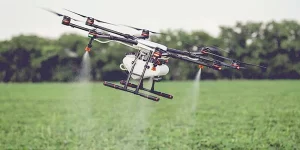Los drones agrícolas están revolucionando la producción agrícola, Sin embargo, todavía existen algunos problemas:
- Uso indebido de productos químicos: La fumigación repetida o la mezcla inadecuada de pesticidas pueden dañar los cultivos.
- Vuelo impreciso: En campos densamente poblados, Puede resultar en una fumigación omitida o repetida.
- Cumplimiento de normas: El registro manual del uso de pesticidas y fertilizantes no pasará las auditorías de la EPA / FDA.
- Mantenimiento de equipos: Undetected motor or battery problems can cause mid-flight failures.
Your competitive advantage:
Provide intelligent and compliant drone solutions with integrated RFID technology.
Stand out in the precision agriculture field with data-driven spraying systems.
Based on the characteristics of RFID technology, it can help farmers solve the following production problems:
1.Pesticide tracking and waste reduction
Problema: Manually recording pesticide batches may lead to overuse or batch mismatch.
Solución RFID:
- Use UHF RFID tags to mark chemical containers.
- Drones scan tags before spraying to ensure the correct pesticide ratio and automatically update inventory.
2.Automatic report generation
Problema: Handwritten records delay audits and may be fined for improper use of pesticides.
Solución RFID:
- Store spraying records (tiempo, ubicación, chemical ID) on high-memory RFID tags.
- Synchronize data to farm management platforms such as DroneDeploy to generate audit reports immediately.
3.Predictive maintenance of drone components
Problema: Sudden failures during flight may damage crops and delay operations.
Solución RFID:
- Install RFID-enabled tags on drone components to track the full life cycle of different components.
- Monitor component usage and trigger alarms through platforms such as DJI Agras.
[En contacto con nosotros] Get a test sample of rugged RFID tags for pesticide container tracking, nozzle maintenance tracking, and component lifecycle management.
 RFID and Drone Integration Implementation:
RFID and Drone Integration Implementation:
Colocación de etiquetas:
- Chemical Containers: Encode pesticide type, lote, and expiration date with corrosion-resistant tags.
- Field Tagging: Install Monza R6 chip tags at the end of crop rows.
Flujo de datos:
- Drones scan RFID tags during pre-flight inspection and during spraying, and data is synced to cloud platforms such as AgriSync for real-time analysis and reporting.
Resultados clave:
- Agrichemical waste was reduced by 20-30%.
- Audits were completed 50% faster through automated compliance logs.
- Equipment failures were reduced by 40% through predictive maintenance.
Ready to implement RFID for your autonomous spraying drones?
We can provide you with a field-tested RFID solution. En contacto con nosotros:
- Pruebe las etiquetas RFID de forma gratuita: Validate their performance in your specific agricultural production environment.
- Get a customized ROI plan: Descubra cómo RFID puede reducir costos y mejorar el cumplimiento.
Preguntas frecuentes
Q: Will RFID tags interfere with drone communication systems?
A: No! FRECUENCIA ULTRAELEVADA RFID (860-960 MHz) does not operate within common drone frequencies (2.4 GHz/5.8 GHz).
Q: How can I retrofit RFID to an existing drone?
A: Use lightweight adhesive tags – adds less than 5 grams to each drone.






